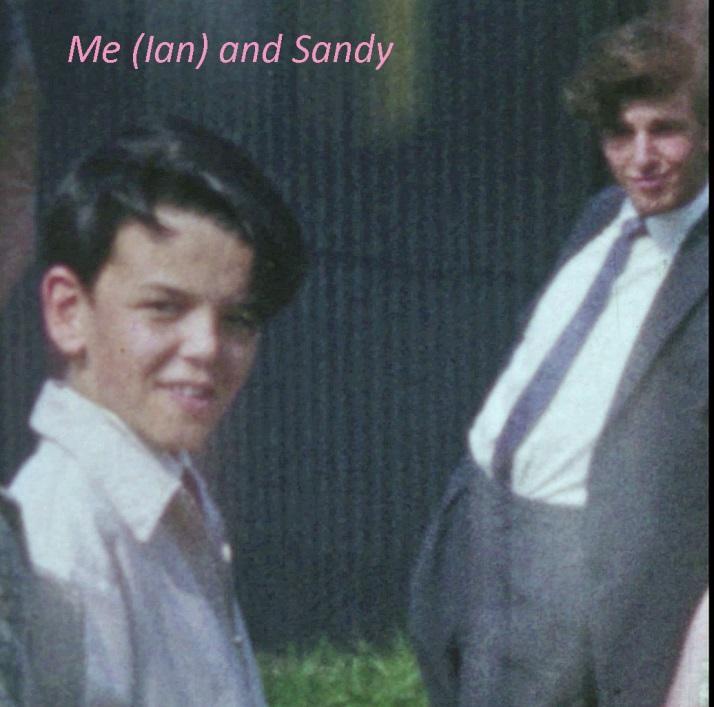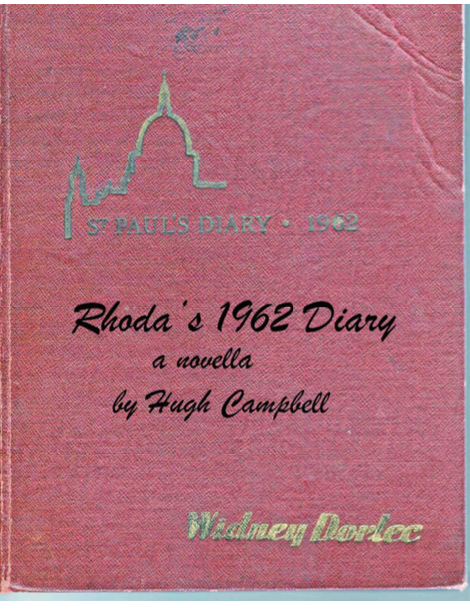
My mother bakes ‘Battenburg’ cakes with Esther. This note in her diary awakens memories, not least of Battenburg cakes! They are visually attractive, but I never liked the marzipan covering that much.
But this note in her diary tells that my mother’s household skills know no limits! Of course, as a young boy, you never really appreciated this. In other words, I can’t say that I explicitly ever ‘missed mum’s apple pie.’
School dinners
If I were to be irreverent, I might say the only thing I missed about the food of my youth was the school dinners! These were traditional English dinners that are almost impossible to find today. About 15 years ago, I visited one of Butlin’s holiday camps in southwest England with my young son Alan. They still served glorious ‘English food’, that is, ‘everything is with custard and mashed potatoes’. I hated school as a teenager; perhaps the only thing that kept me ‘sane’ was the school dinners.
What is a ‘rebel’?
My mother was a conservative. But conservatives can also be radicals or rebels. I remember Auntie Violet saying that her sister Rhoda was always a ‘rebel.’
Similarly, my eldest brother, Sandy, was an apple that did not fall too far from the tree. In many ways he is a conservative, but in other ways, he is, like my mother, a radical and a rebel. Radicalism and rebellion are often associated with the left of the political spectrum.
But the fact of the matter is that in the late twentieth century, it was the conservatives who stood for ‘radicalism’, such as Reagan and Thatcher. In other words, the only successful ‘rebels’ during the post-war period were to be found on the right of the political spectrum. Thatcher fooled people into thinking her policies were essential to the growth of prosperity and opportunity, but all she did was make the rich richer and the poor poorer.
Although this is in a slightly different context, the British post-war working class that voted for Thatcher had perhaps forgotten the old song:
It’s the same the whole world over,
The poor what gets the blame,
It’s the rich what gets the pleasure,
Isn’t it a blooming shame?
The ‘rebel’ and his petition
In this context, I am the diametric opposite of my eldest brother, Sandy. He has always been the conformist, and I have always been the ‘rebel’. But when he attended the Isis Private School in Bolton (which I also attended), he petitioned against the poor quality of the school dinners, acquiring the signatures of several hundred pupils! In one way or another, he had managed to get hold of a long roll of paper. In other words, the petition resembled historical petitions of the past. I remember reading this petition when I was younger, but it has disappeared from ‘the archives’.
In other words, he presented the petition to the headmaster, Mr Hoyle, demanding improvements, or he and the other pupils would go on a ‘semi-hunger strike’, and boycott school dinners! I’m not sure what the outcome was.
In contrast to my brother, I loved Isis’ school dinners, but perhaps they had improved due to his petition, as this was in 1961-62, some three or four years after his petition! Perhaps it was the success of his petition that made me more sympathetic to ‘institutional food’.
Free milk and ‘free’ school meals
When I was a teenager all English schoolchildren received free milk and subsidised school dinners. However, after the ‘Thatcher Revolution’, policies of ‘Robin Hood in reverse’ were launched. It is well known that Robin Hood robbed the rich and gave to the poor. But the Thatcher politics of the last 50 years (1970 onwards) have robbed the poor and given to the rich, according to some dubious theory that the poor can become fatter from eating the crumbs from the rich man’s table (‘Trickle Down Theory’). However, we can’t delve into Conservative educational and economic reforms here.
Ding dong, the Witch is dead
Most people have seen the movie “The Wizard of Oz” starring Judy Garland and based on the novel by Frank L. Baum. But perhaps not everybody remembers the scene where they rejoice that ‘the wicked witch is dead.’
Thatcher ‘the witch who stole the milk from the children’
Thatcher became known as ‘the witch who stole the milk from the children’. On her death, many people in Britain celebrated that the ‘witch was dead’ (see YouTube for the video “the bitch is dead”). Unfortunately, after her death, neoliberal politics aimed at making the rich richer and the poor poorer was still alive and kicking.
“The Witch Who Stole the Milk” – written by Ruth Joy
Once upon a time, as it’s once been told,
There lived a witch so vicious and cold,
She went to town when the children were sleeping,
And into their homes, came creeping, their milk stealing.
The children awoke and found their milk gone.
They cried and cried from dusk till dawn.
The witch was wicked, and she did not care,
Leaving her cruel laugh hanging in the air.
Watching, lurking, in the shadows of the night,
She enjoyed causing them such strife.
Hiding behind her feigning smile,
She was a witch devious, cunning, and vile.
With frizzy hair that’s sprayed into place,
She made the parents do a desperate chase.
Their pleas fell on deaf ears and were to no avail.
The witch had vanished without leaving a trail.
Let this be a lesson to all women and men,
Don’t let any old witch steal from the children again!
One day, the Gods held an assembly.
They were dismayed with the wicked witch.
So one fine day they sent a cyclone,
That brought the wicked witch to her doom,
As she was flying on her broom.
She was pronounced dead!
And thru the land the joyous news was spread.
Ding-dong, the witch is dead!
Let’s open up and sing, and ring the bells out
Ding-dong! the merry-o sing it high, sing it low
Let them know the wicked witch is dead!
Conservative Education Act 1980 – no more ‘free’ school dinners
By 1980, Thatcher was prime minister and introduced a new Education Act, not only removing free school milk from all children (which she had done before in 1971), but also removing ‘free’ school dinners.
Of course, when I was a kid I was never ‘starving’. However, in modern Britain, many children are ‘starving’. This is something that the Manchester United soccer player, Marcus Rashford, has highlighted: “Let’s EndChildFoodPoverty together.”
My point here is that only providing food assistance to ‘the poor’ in schools will obviously create a stigmatizing mechanism. One can argue that ‘the rich’ don’t need subsidized meals, but this is missing the point. Schoolchildren need to eat during the course of a long school day. Moreover, this is a communal and social activity, so it makes sense that children should ‘eat at the same table like brothers and sisters’.
School dinners in the 1990s
Around 1990, I studied as a student teacher in Surrey, England. The government no longer subsidized school dinners to the same degree as before. They included the ‘choices’ of pupils, so the main course was often ‘pizza, potato crisps, and coke’. Ok, I’m exaggerating here—you could still buy the traditional British food of meat and two vegetables, but a ‘watered down’ version. From a larger perspective, it is the diet of a nation that makes or breaks the nation. In other words, due to the ‘Thatcher Revolution’, school dinners had deteriorated, while the rich had become richer. Thus, when I was a kid we always had ‘meat and two veg’ (fish on Fridays), raw carrots, water, and a dessert, such as apple pie and custard, or other dishes, such as tapioca, rice pudding or semolina, and many others (it was quite varied and creative!).


